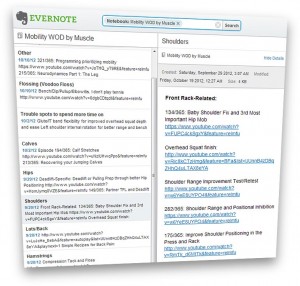
So when you do get injured, it’s obviously a great idea to seek care from a medical professional.
#Mobility wod how to#
It’s about time we all learn how to prevent these chronic movement dysfunctions from happening So why is it then that we wait until our back hurts before we seek medical attention? Why do we wait to mobilize our neck until it’s so tight we cannot turn to check our blind spot while driving? Waiting for pain symptoms to occur and then getting treatment is like waiting until you get a cavity, get it treated, then realizing brushing/flossing might have been a good idea all along. They get it, but they don’t have a solution for the human body’s movement systems like brushing their teeth and flossing. You see, everyone I ask that question to just rolls their eyes and nods along. Get mad at the culture of medicine and doctors that didn’t teach you preventative care for the musculoskeletal system like dentists did for oral hygiene.

Don’t get mad at the rhetorical question.

Please don’t form a mob and riot against the muscles…ĭo you wait until your teeth hurt before you start to brush them? No, you don’t. Kelly Starrett estimates that 98% of the dysfunctions that lead to injuries or symptoms including pain, tightness, stiffness, soreness, numbness, tingling, and so on are due to mobility limitations! Ninety-eight percent – that’s a sh*t-ton, like almost all of the problems that exist in the world of movement training! The solution is simple – MOB ALL THE MUSCLES! (mob = mobe = mobilize). Highlighted in Becoming a Supple Leopard, Dr. What is ideal movement/posture anyway? If you’re like most people I encounter, you need to radically change how you prepare your body for life-long functional movement, otherwise aging will be a not-so-fun process for you. You can hope to attain perfect movement patterns, but you will never attain them at the rate you are going. Not at your job, not when you sleep, nor while you plays sports and exercise. Your tissues are glued down, laminated, and stuck together.

You are not moving at your absolute peak potential. For most of us, it’s time for a reality check.


 0 kommentar(er)
0 kommentar(er)
